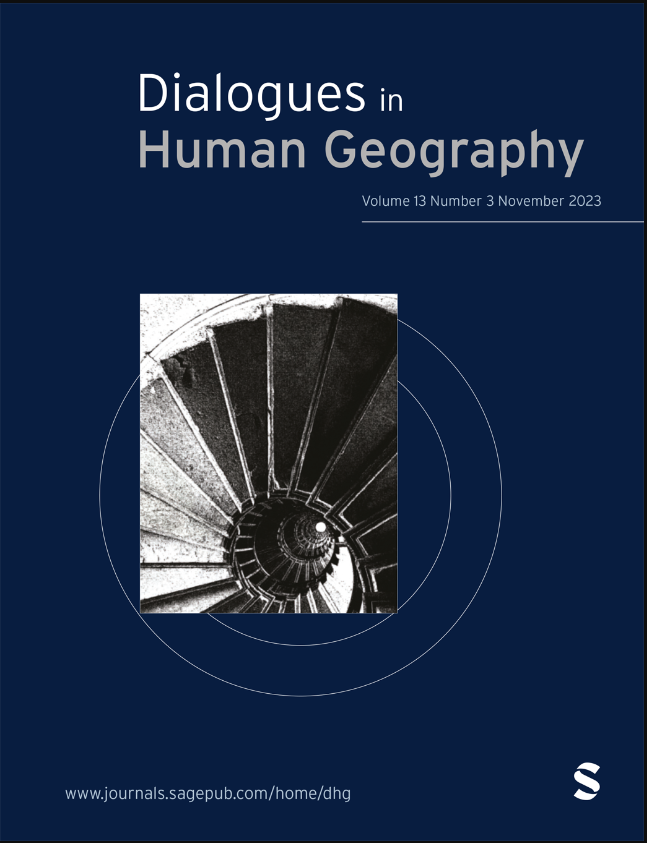‘Organize, organize, organize’: The act of surrounding, one to another
IF 8.2
1区 社会学
Q1 GEOGRAPHY
引用次数: 0
Abstract
It has been an honour to have such wonderful scholars, whose work I really respect, put in the work to read and say something about this book. Many salient questions are asked, and points raised in the commentaries. Narayanan Palat invokes the once again controversial notion of ‘the field’ as a medium in which researchers both are surrounded by particular conundrums and surround the everyday practices of those with whom a certain distance is constituted through a practice called ‘research’. What is the surrounds here, they ask, and what are the ethics and politics of a ‘figure’ that both belongs and is detached from a situation, or where neither belonging or detachment is an adequate term for the positionality entailed. Who surrounds who, and where this is not a question that can be attributed to a specific designation or geography? While Lalitha Kamath views the surrounds as an atmospheric condition for a subaltern politics – something to which I might only partially subscribe, they nevertheless, point out the almost intractable dilemmas entailed in apprehending the resourcefulness of the working poor who continue to reinvent the conditions of endurance – but barely. And certainly not in terms that are just or sufficient. Kamath is attentive to the multiple archives of itineraries evident in the working poor peripheries of Mumbai, itineraries that reflect a constant sense of movement; that things don’t stand still; that one is fully captured by a specific position, even as possibilities are intensely gendered and subject to sweeping ‘counterinsurgencies’ by various forms of state power. Here the questions about the extent to which autonomy can be materialized by being left to one’s own devices and the concessions to be made by being ‘taken care of’ through the reciprocal responsibilities of state and citizen are not easily reconciled, and must ‘taken on’ as a matter of a constant re-arrangement of their mutual relations as surrounds. Additionally it is important to emphasize the conceivable ways in which researchers are both imbricated and co-producers of surrounds, the south, and the metropolis, and how these are in an always oscillating relationship with each other. And as they are repeated in some kind of integral relationship – meaning that that the south might surround the metropolis, as the metropolis surrounds the south – as well as researchers being surrounded by often impossible positions from which they nevertheless try to do something – that the surrounds becomes the term for shifting relations of encompassment and detachment, of reciprocity and rupture. This is not just a matter of the perspective of researchers but a structural condition. A structuring that always entails a multiplicity of conceivable conjunctions, of what might be. Even if metropolis and south are limiting terms, their very repetition points to the possibilities of something else besides what we know and assume, that might have been present all along. One can begin quite literally and take ‘the surrounds’ as that atmospheric, morphological, metabolic, architectural, topographical, social and lived space, which surrounds ‘you’, the actor, and组织,组织
我很荣幸有这样优秀的学者,他们的工作我真的很尊重,他们能在工作中阅读并谈论这本书。评论中提出了许多突出的问题和要点。纳拉亚南·帕拉特(Narayanan Palat)再次引用了“领域”这一有争议的概念,将其作为一种媒介,在这种媒介中,研究人员既被特定的难题所包围,又通过一种称为“研究”的实践来围绕那些与之形成一定距离的人的日常实践。他们问道,这里的环境是什么,一个既属于又脱离一种情况的“人物”的道德和政治是什么,或者归属或脱离都不是所需立场的恰当术语。谁围绕着谁,在哪里这不是一个可以归因于特定名称或地理位置的问题?Lalitha Kamath将周围环境视为下层政治的一种氛围条件——我可能只部分同意这一点,但他们指出了在理解那些继续重塑耐力条件的在职穷人的足智多谋时所面临的几乎棘手的困境——但几乎没有。当然,这还不够。Kamath关注孟买贫困地区的多个行程档案,这些行程反映了持续的运动感;事情不会停滞不前;即使可能性具有强烈的性别歧视性,并受到各种形式的国家权力的全面“反叛乱”的影响,这种可能性也会被特定的立场所充分捕捉。在这里,关于自治在多大程度上可以通过自己的方式实现,以及通过国家和公民的相互责任“照顾”做出让步的问题是不容易调和的,必须作为不断重新安排其相互关系的问题来“接受”。此外,重要的是要强调研究人员是周围、南部和大都市的叠加者和共同生产者的可能方式,以及它们之间如何始终处于振荡关系中。当它们在某种整体关系中重复时——这意味着南方可能会包围大都市,就像大都市包围南方一样——研究人员被通常不可能的位置包围,尽管如此,他们还是试图从这些位置做些什么——周围变成了一个术语,用来改变包容和超然的关系,互惠和破裂。这不仅仅是研究人员的观点问题,也是一种结构条件。一个总是包含多种可能的连词的结构。即使大都市和南部是限制性的术语,它们的重复也指向了除了我们所知道和假设之外,其他可能一直存在的东西的可能性。人们可以从字面上开始,将“周围”视为围绕着“你”、演员和
本文章由计算机程序翻译,如有差异,请以英文原文为准。
求助全文
约1分钟内获得全文
求助全文
来源期刊

Dialogues in Human Geography
GEOGRAPHY-
CiteScore
8.00
自引率
4.00%
发文量
86
期刊介绍:
Dialogues in Human Geography aims to foster open and critical debate on the philosophical, methodological, and pedagogical underpinnings of geographic thought and practice. The journal publishes articles, accompanied by responses, that critique current thinking and practice while charting future directions for geographic thought, empirical research, and pedagogy. Dialogues is theoretically oriented, forward-looking, and seeks to publish original and innovative work that expands the boundaries of geographical theory, practice, and pedagogy through a unique format of open peer commentary. This format encourages engaged dialogue. The journal's scope encompasses the broader agenda of human geography within the context of social sciences, humanities, and environmental sciences, as well as specific ideas, debates, and practices within disciplinary subfields. It is relevant and useful to those interested in all aspects of the discipline.
 求助内容:
求助内容: 应助结果提醒方式:
应助结果提醒方式:


